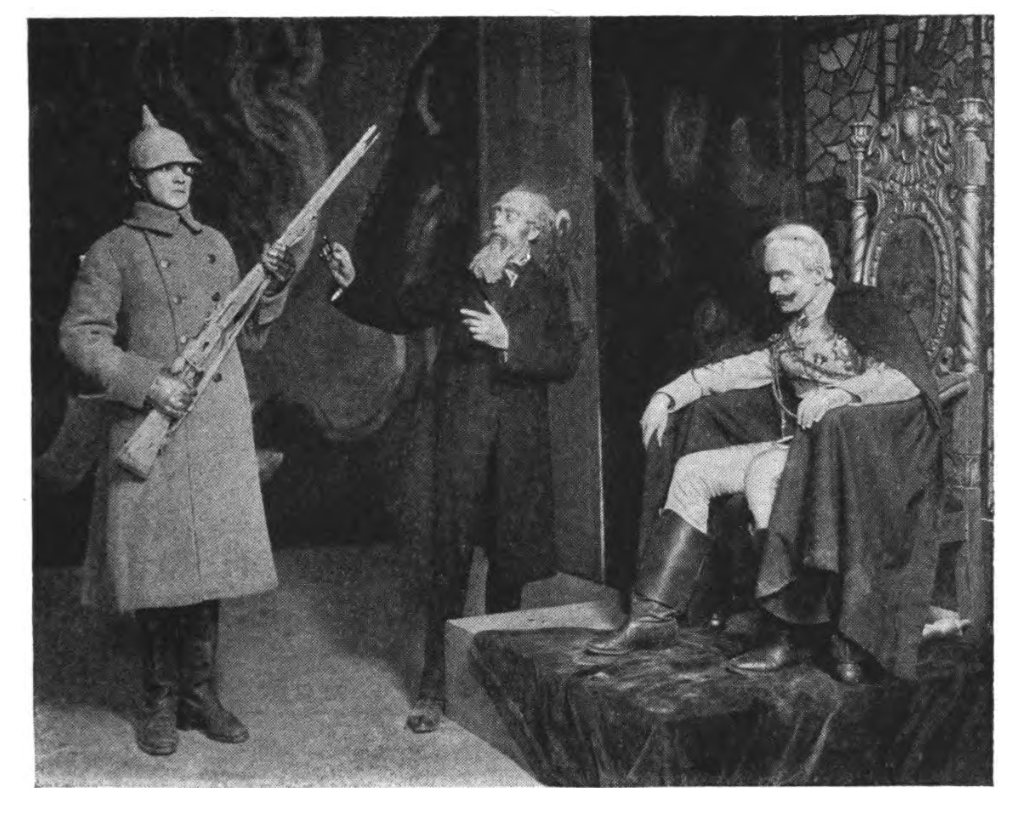BLOOD AND IRON (4)
By:
December 3, 2023

“Blood and Iron: A Play in One Act,” A Radium Age proto-sf ancestor of The Six Million Dollar Man and RoboCop, was first published in the December 1917 issue of The Strand. (Note that the play predates Karel Čapek’s “R.U.R.: Rossum’s Universal Robots” by four years.) HiLoBooks is pleased to serialize it here for HILOBROW’s readers.
ALL INSTALLMENTS: 1 | 2 | 3 | 4 | 5 | 6 | 7 | 8.
241: Noth—ing.
SCIENTIST (Smiles knowingly at Emperor. Turns card over.): Ah, very good. (SCIENTIST holds card up again.) Once more.
241 (After a moment of staring he reads deliberately.): A — nation’s — will — should — be — the — will — to power!
EMPEROR (Takes card from SCIENTIST and glances at it.): Correct!
SCIENTIST (Crossing to centre and returning card to portfolio, then addressing EMPEROR.): This is my greatest achievement. Never has science
done so much for the human animal. From a shattered, bleeding wreck of no value to his country I have made him into an efficient man — hands of steel, leg of bronze, arm of nickel and aluminum, telescopic eye, an ear that — (241 bends his ear of stage left.)
EMPEROR (Startled.): You hear something? What do you hear?
241: A — bugle — call — sounding the assembly!
EMPEROR: Impossible! Open the door!
(SCIENTIST opens door and distant bugle-call is faintly heard of stage.)
EMPEROR (In astonishment.): God in heaven! Miraculous! (as SCIENTIST gently closes door aglow with triumph). What have you accomplished?
SCIENTIST (With fervour.): A resurrection!
EMPEROR: Complete!
SCIENTIST: A triumph over matter. The fragment of a soldier reconstructed under the magic touch of Science, without which he would to-day be rotting on the field — a source of pestilence — a worthless thing. Science set him on his feet, gave him a leg, an arm, hands, a telephonic ear, a telescopic eye!
EMPEROR (Leans back and deliberately inspects 241.): How long have you been in my service?
(241 hesitates and salutes.)
SCIENTIST: You may speak.
241: Eighteen — years — Majesty.
EMPEROR: Married?
241: Yes, Majesty.
EMPEROR: Children?
241: Seven — Majesty.
SCIENTIST: Five sons!
241 (Bitterly.): One dead — three at — the front — my youngest follows —
EMPEROR: His age?
241 (Swallowing.): Sixteen!
EMPEROR (Coldly to SCIENTIST, referring to 241.): When does his furlough end?
SCIENTIST: Noon, to-morrow. By nightfall he will again be in the trenches.
EMPEROR (Reflectively.): And if he returns I will award him the Triple Cross. (More brightly.) This will stimulate the military ardour of the Crown Prince. It will delight him to see this reassembled soldier.
RADIUM AGE PROTO-SF: “Radium Age” is Josh Glenn’s name for the nascent sf genre’s c. 1900–1935 era, a period which saw the discovery of radioactivity, i.e., the revelation that matter itself is constantly in movement — a fitting metaphor for the first decades of the 20th century, during which old scientific, religious, political, and social certainties were shattered. More info here.
SERIALIZED BY HILOBOOKS: James Parker’s Cocky the Fox | Annalee Newitz’s “The Great Oxygen Race” | Matthew Battles’s “Imago” | & many more original and reissued novels and stories.
